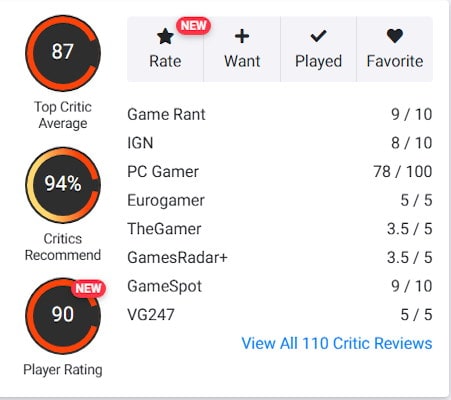OpenCritic, the video game review aggregator website created as an alternative to Metacritic, has changed since its recent acquisition by Valnet. One of these changes is allowing players to post reviews for any game on the website.
However, unlike other sites that let players review games, OpenCritic is separating reviews into two categories: the “Critics Recommended” score, which consists of reviews from gaming journalists, and the new “Player Rating” score. This allows anyone to review their favorite games without affecting the critic scores. It also helps mitigate the damage when people decide to review bomb a game for whatever reason. However, there’s one issue: zero verification. As long as you have a Facebook, Google, Twitch, or Steam account, you’re free to post a review. There’s no validation on if you even played the game in question or for how long. Tell me that doesn’t raise some red flags.
I’ll be honest—I don’t like this one bit. To back up a bit, as mentioned, OpenCritic was created as a response to Metacritic, offering a friendlier and more professional transparent approach to aggregating game reviews. By allowing anyone to post reviews, it feels like the waters are getting muddied. Yes, there will be two separate review scores, but ultimately, this could undermine the credibility of the professional reviews, which are done by people who have earned the right to be recognized as gaming journalists.
There’s no simple way for me to say this without risking backlash, so I’ll be blunt: OpenCritic was created for video game journalists, and now that focus is shifting. Not to mention, this opens the door for potential chaos. We already see friction between some gamers and game journalists on social media. Now, OpenCritic is inviting people who may have personal or political disagreements to contribute to the reviews. While more voices aren’t inherently a bad thing, could enable people to push their agendas while pretending to provide genuine feedback.
The thing is, when a game journalist writes a terrible review, right or wrong, they get called out for it—this usually happens. And in doing so, either people lose trust in that person or outlet, or, as we’ve seen before, the review gets pulled. But letting a random person write a review with complete anonymity. Right now, we can see what the reasoning behind the player review is. There’s just a raise or drop in the Player Rating score—what does that accomplish?
I’m all for people posting valid critiques about a game—I love that. You can never have too much thoughtful criticism. However, this change opens the floodgates for people to spam one-star reviews without any validation. What’s to stop someone from creating multiple accounts to tank a game’s rating? This is what frustrates me the most: as trust in gaming journalism fades, more people turn to other players’ opinions. But if those opinions are just traps to sabotage a game’s rating, then what’s the point of any of it?
I don’t know about this, Valnet. This idea needs more thought behind it or you’re opening the door to a much bigger problem. I love OpenCritic for what it is and I don’t want to see it ruined. Let’s see what you have cooking and how it will better OpenCritic.



